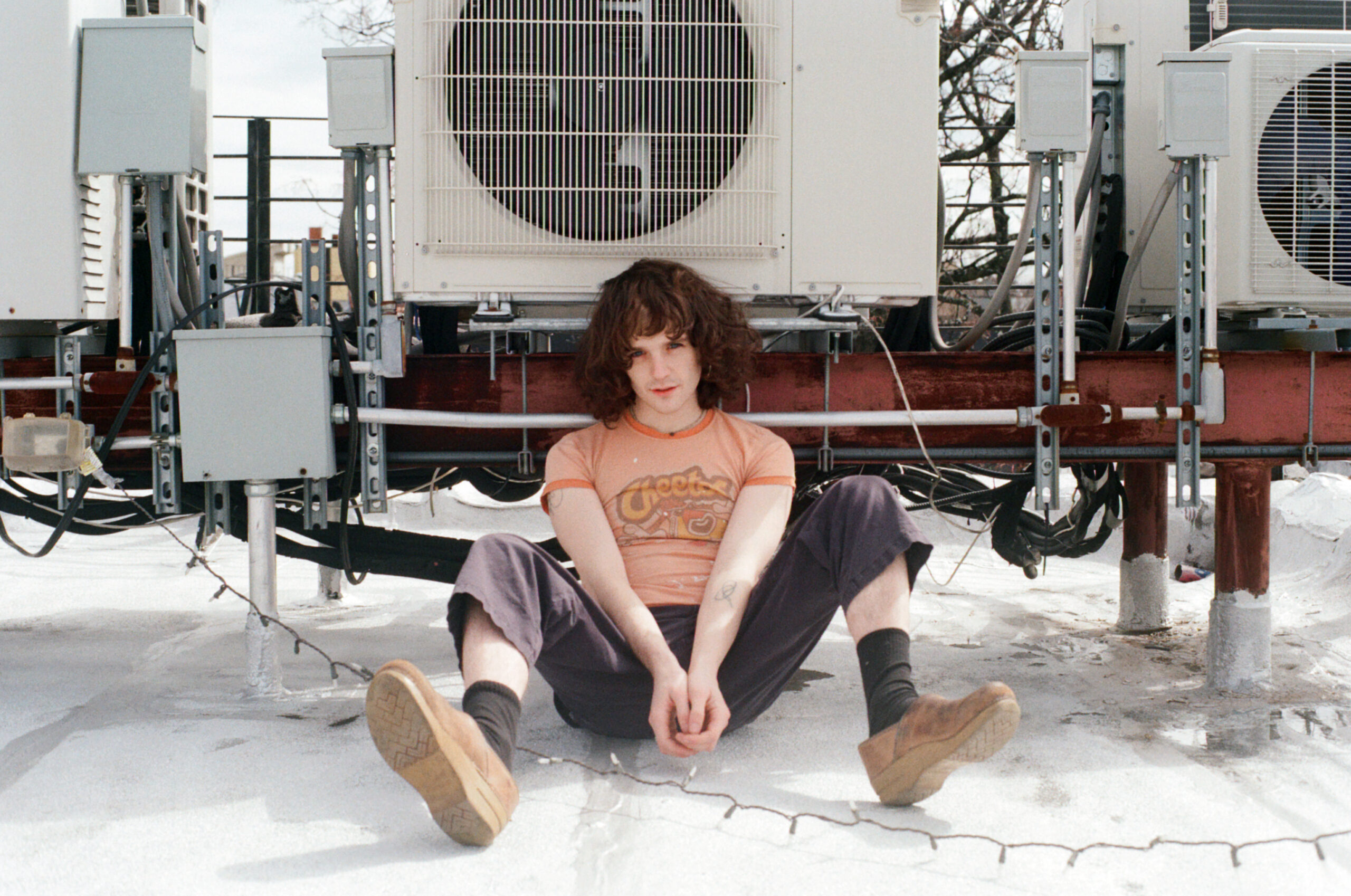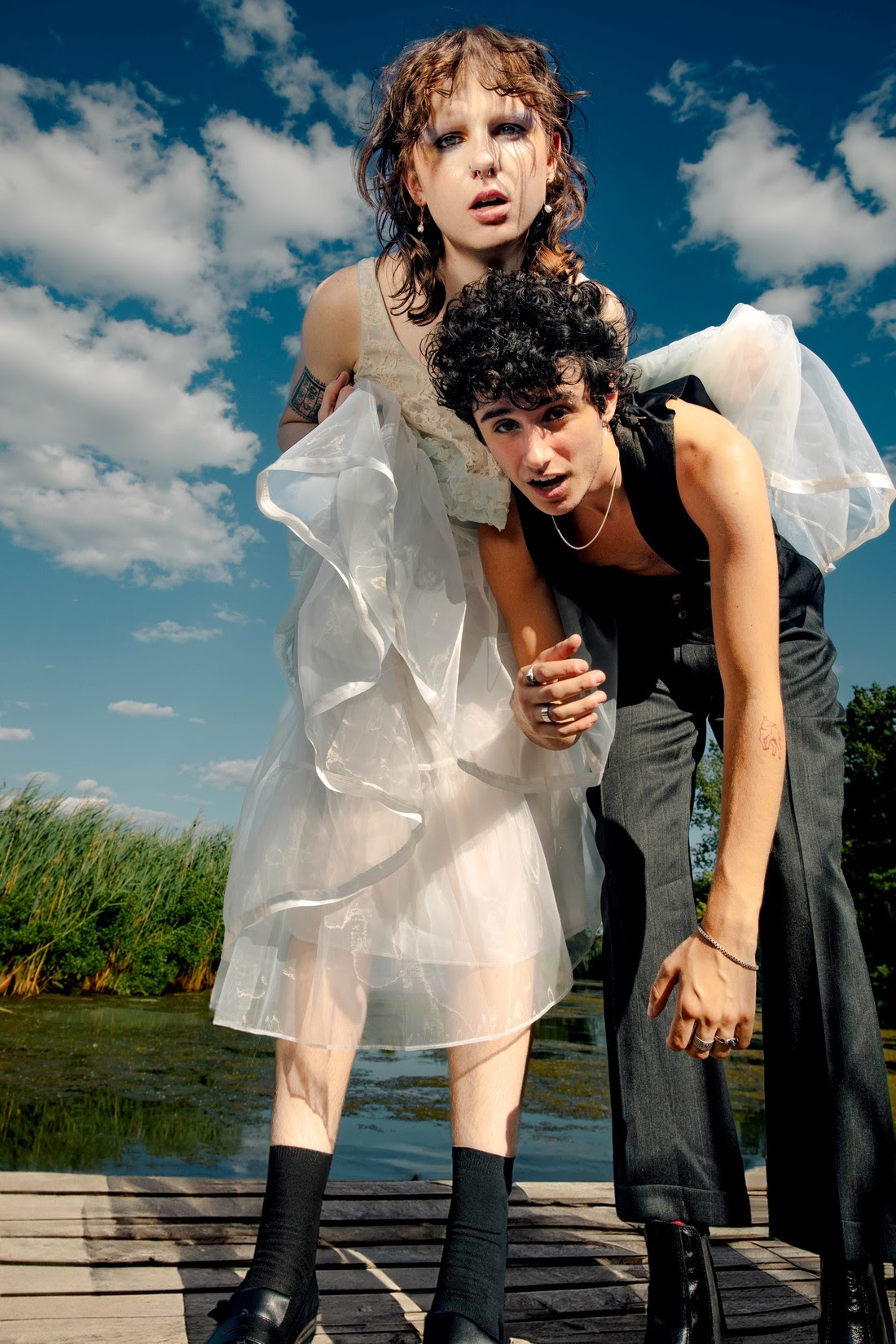Jockstrap recreate the feeling of a teenager discovering dubstep for the first time in 2010. The kind of music that far out-accelerates brain waves, leaving you dizzy and confounded after the track's end.
Formed by jazz violinist Georgia Ellery (who also plays with Black Country, New Road) and electronic producer Taylor Skye, each of the duo's songs contain twisted and minced up influences — a mixing idea they heard on a Madonna track, a feeling they had one Friday night, a joke from a friend, a song they heard on the radio several years ago — and turns them into something possibly unlike anything else you've heard before. Something vomit-inducingly fun.
The pair originally met while studying at London's Guildhall School Of Music & Drama and have built up a quick reputation for their maverick-like range of structure, emotion, theatricality and whimsy. Since emerging in late 2017 with their first single, "I Want Another Affair," Jockstrap have collaborated with the likes of Dean Blunt and Mica Levi, and become one of London's most exciting new musical prospects. With near-peerless technical prowess, their songs masterfully choreograph the listener's attention and emotional reactions. A typical Jockstrap song will inspire confusion, bemusement, laughter — and often in quick succession.
Even so, on their debut album I Love You, Jennifer B — out next week via Rough Trade Records—the pair have managed to warp expectations. Going beyond their established kinetic aesthetic, they explore moments of stillness — balancing the lovely with the repulsive, the hyperactive with the lackadaisical — to create a whole and holistic piece of work that feels new and exploratory, even for them.
In a recent conversation, the duo told me their unique creative process, how a schoolgirl inspired their first album, and some dude called Melch.
Has music historically been a way for you to socialize or a way to isolate yourself?
GEORGIA ELLERY: For me it was social, but I don't know whether that was because I was in orchestras. I enjoyed socializing more than playing when I was younger.
What age did you start playing violin?
ELLERY: I started when I was five, and then I started playing in orchestras when I was about 12. That's when I really started to enjoy it, when I was playing with other people. I didn't really like playing music by myself.
Did you want to be a violinist aged five?!
ELLERY: No, absolutely not.
SKYE: Music for me started off as quite a solo thing. I started playing the piano; you don't really need to play with anyone else to do that. I started playing at home. Then I was in quite a lot of school bands and we'd go on trips together. Then I'd go home and produce by myself, but at school my friendship group was based around music. I'd go into my music tech room every lunchtime and we'd just hang out there. Music became both my social and my private life.
Do you remember the first musician you discovered and fell in love with independently, without your parents' or anyone else's influence?
SKYE: For me it was a producer called Flux Pavilion. I found him on the computer.
ELLERY: My older step sister played loads of Destiny's Child, so then I went in and discovered Beyoncé.
What drew you towards electronic music?
SKYE: I find playing other people's music really stressful and nerve-wracking, and I found that especially difficult doing grade, having to be set against something already written. I liked the idea of writing my own music so I just improvised on piano and then my dad brought home a laptop one day and something clicked. Once you get a laptop you can start thinking about electronic music more.
When you heard Flux Pavillion and dubstep for the first time, did that reconfigure what you thought music could do?
SKYE: Yeah, there was one Flux Pavillion song in particular called "Cracks," it shook me emotionally unlike anything else before. Around that age, I was looking for stuff that excited me. I hadn't heard anything like that before, I don't think the world had heard anything like that before. It was game-changing.
ELLERY: Taylor's describing the feeling of listening to dubstep. We try and recreate that feeling when we make songs; we try and make that emotional connection. When I'm listening to our music and when we're editing it, thinking about how to make it — we're both searching for that feeling.
Would you say originality is your aesthetic credo when it comes to making music?
SKYE: Yeah, because originality pushes things forward and that's what's exciting for us. When I hear something new it's one of the best feelings for me.
What was the last *new* thing you've heard, other than your own music?
SKYE: For me it was probably Donda. When I first heard it I wasn't very interested in it, and then suddenly it all clicked for me. It felt like a different perspective on making music
ELLERY: And for me, Two Shell. Someone sent me an untitled mp3 of theirs and I didn't know it was them. I thought it was really fresh.
How do you reconcile the privacy of music-making to then having to do something so public facing as live shows?
SKYE: We both wanted that. We both want to live off of this, and we knew that's how we had to achieve that, making our music public. We thought from the beginning about how we were gonna put this out. As soon as we made the first song we were thinking about stuff like what images to use with it. It's been part of what we do from the beginning.
ELLERY: Performing isn't the most difficult thing for us.
SKYE: It's also quite enjoyable to get out. It does feel like when you spend so much time inside, getting outside is a really necessary part of the process.
Do you feel like this whole thing has taken off pretty quickly?
ELLERY: We hoped it would get some attention. We thought the music was good. We had a confidence with the way we put out the first couple of singles with a video. "Look, here we are." That drove us. If you give off that confident front, you're gonna get there. We're also lucky.
SKYE: We're also not as big as others who blow up. We just did a few magazine interviews. We could handle it.
ELLERY: Unfortunately, we didn't have a viral TikTok hit.
When you first met, was it initially just the music that drew you two together?
SKYE: We both had a similar sense of humor.
ELLERY: Initially it was just music. We didn't know each other before. We worked together and a friendship followed.
SKYE: We like similar films, too. I like Tarkovsky and Georgia likes Bergman.
ELLERY: And we both like books, fashion, stuff like that.
SKYE: And taking care of ourselves. Neither of us party. We both have similar needs.
Do you tend to make your music separately or in the same room?
ELLERY: Sometimes we're in the same room. This album we'd done a bit where we started together. Usually, I'll write a song separately by myself, then Taylor will do the initial production by himself, that's sort of how we prefer working.
You said that your sense of humor brought you together, is that an important influence on the music also?
ELLERY: Definitely.
SKYE: It keeps it fun as well.
ELLERY: Some of the best decisions we've made have come from just riffing stupid shit, I think.
SKYE: We share a silly, sometimes quite dark sense of humor. Funny voices get us.
ELLERY: Yeah, funny voices! We have that all the way through. We do it in our music, either from us or this guy called Melch. We have a library of his skits that we use now.
Melch?!
ELLERY: We went to Guildhall with him. He's a drummer and a dancer and an all-around amazing person. He was a performer in our first iteration of the live band when we were a five-piece. He's a rapper too.
Is he the dude talking about crochet pants on the title track?
ELLERY: That's Melch! He's also on the song "50/50." He's the one who says, "Please can we get someone on this?"
There are moments on this album when you cut from really luscious production to these stripped-down parts that sound like bedroom recordings, like on "Concrete Over Water." Do you ever lift material straight from the demos?
SKYE: That moment in "Concrete Over Water" is actually the one time we were actually in a fancy studio.
ELLERY: It was an in-the-room thing, it was just a first take that we did of that little section.
SKYE: There definitely are bits from different moments of creation on these songs.
ELLERY: The vocals from "Angst" were recorded on a laptop whilst we were on tour. The vocals on "What's It All About" were also taken from the very first demo, and the same for "Lancaster Court." Some parts of "Debra" are like that, too. When we do the vocals, I do one thing and Taylor's like, "That's it." And I'm like, "No! We can stretch it out and make it more." But we do always just go with the first thing. Especially when it's being improvised.
SKYE: We were doing more improvised stuff a few years ago, but then it became really difficult for Georgia to sing it live because we couldn't get back into that weird headspace.
ELLERY: When you're singing it and you're not quite sure what's coming next, you're maybe slightly behind the beat and there's an unsureness to the words you're saying.
So when you make music, is there not much friction between the initial thought or idea and the song itself?
ELLERY: Sometimes it can be very quick. For "Concrete Over Water," the initial inspiration was in the afternoon and then I wrote the lyrics into the evening, then I sent it to Taylor and less than a week later he came back with it fully produced. We didn't really have to do much except for record the strings. Other times it can take a while, figuring out chords, checking whether it's going in the right place. I like to spend a lot time working at things if i haven't quite found the right root. We can be quite back-and-forth for ages as well.
Who is Jennifer B?
SKYE: Oh god. It's quite hard to talk about. It means a lot of things. School. That was when it was. That's it. I think our combined representation of someone from school is hanging over these songs. It's just an album title as well, isn't it.
Do you tend to listen to other music when you're making your own?
SKYE: Yep, each song comes with its own set of influences.
ELLERY: For example, with "Greatest Hits," the obvious influence is Madonna. Her song "Borderline" has a really great progression, where you're in the chorus but you don't realize you're in the chorus because it starts with the same final chord of the pre-chorus. It creates this really imbalanced feeling.
SKYE: And that was paired with the Weeknd and Oneohtrix Point Never's music, where it's quite Blade Runner-y. Those were the two big things for that song.
ELLERY: The production on there, there's so much going on. Taylor worked really meticulously on the tape-y, digital sounds. The song is about the radio and a radio station called Greatest Hits. Taylor wanted to rip the song from the radio.
SKYE: So basically, we sent the song to [BBC] Radio 6 and then they played it really late at night with a name that wasn't Jockstrap. I ripped it off, then we put that against the actual master and picked which bits we wanted from each version and then it got mastered again. So it's been through a lot. There are also bits that have been through a tape machine on that song. It's far away from being just laptop-y now, it's been through the wars.
Who would you like to collab with in future?
SKYE: Cupcakke. I think that may have been more of an interesting choice before she started working with people in the UK. Metallica would also be cool. Sunn O)))...
Is there a right or wrong way to listen to Jockstrap?
ELLERY: We both think that listening to it by yourself, in your headphones, in your room, is maybe the best way to listen to it.
Why is that?
SKYE: I think the music's just too random. When you're with other people you're all going to have conflicted reactions, so you may as well fuck all that and just do it yourself, innit. That's how I grew up listening to music. I imagine we've replicated a bit of the music we grew up listening to while making this album, so there's probably something in the music that asks for that [solitude]. After school, come home, get a Monster, listen to the album.
I Love You Jennifer B is out 9/9 on Rough Trade.
We rely on reader subscriptions to deliver articles like the one you're reading. Become a member and help support independent media!







